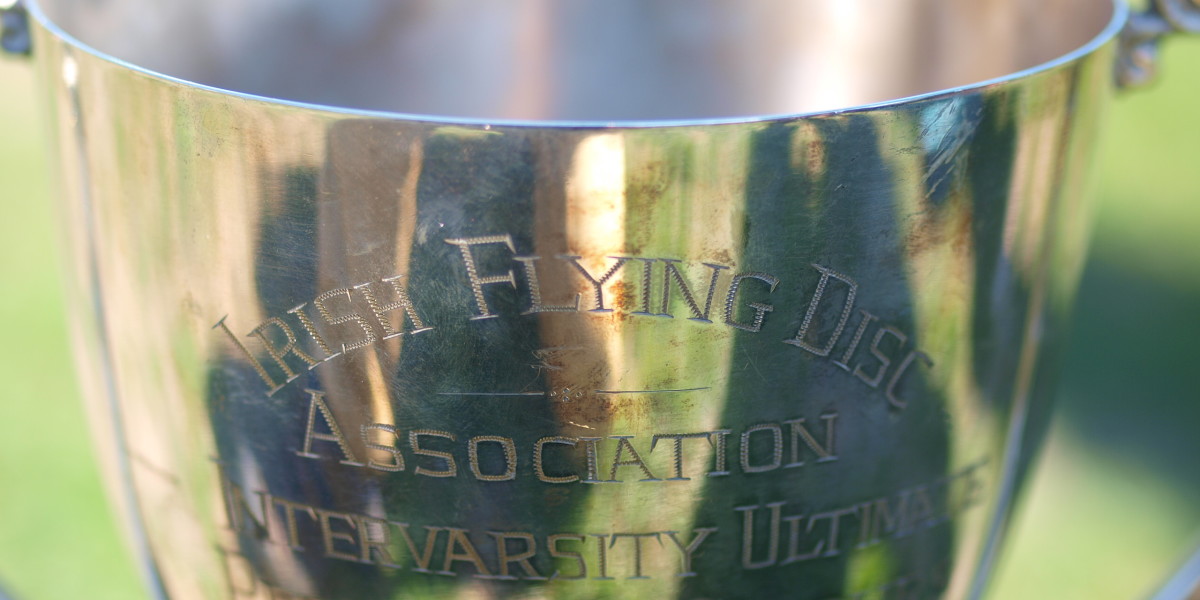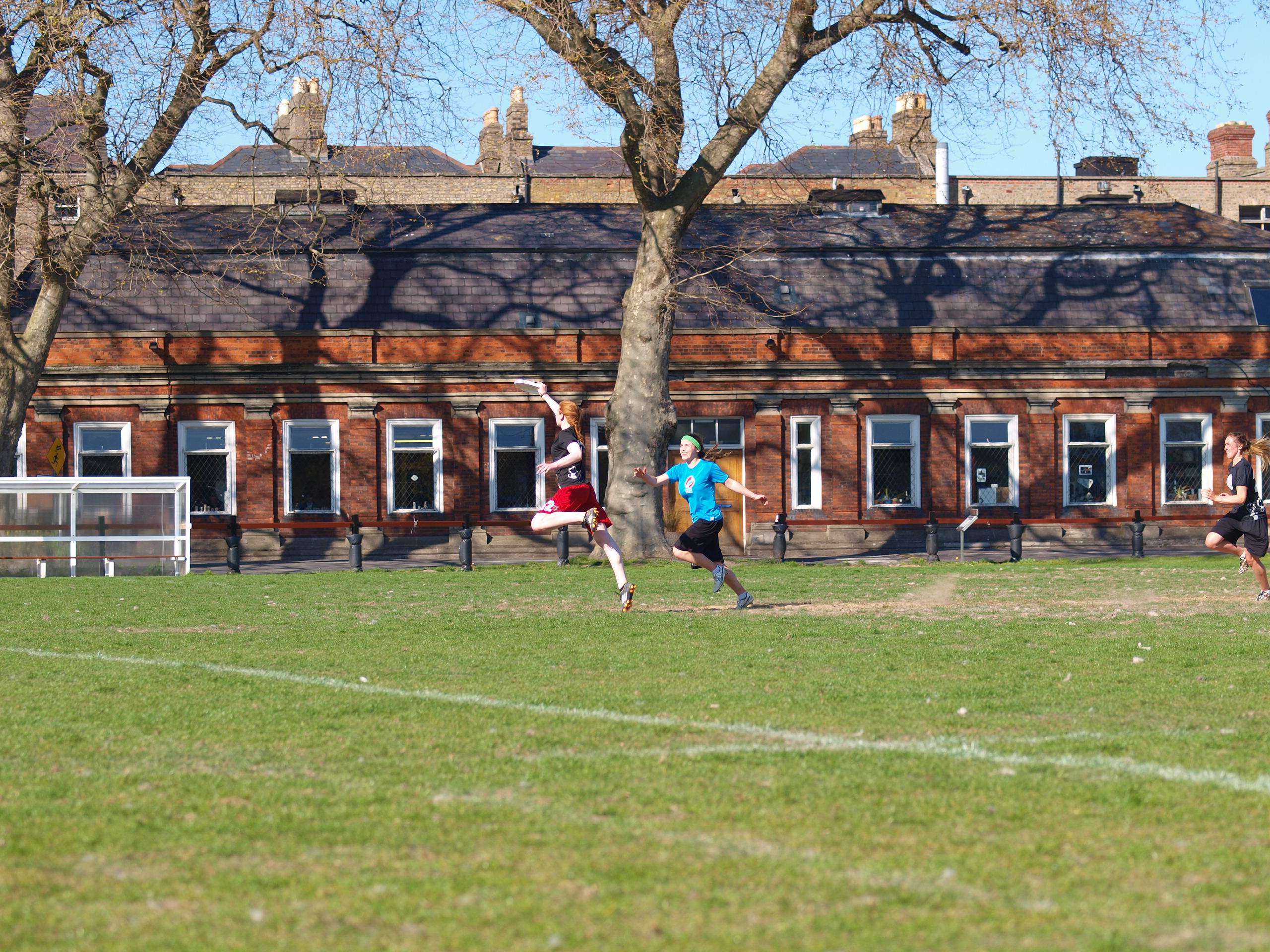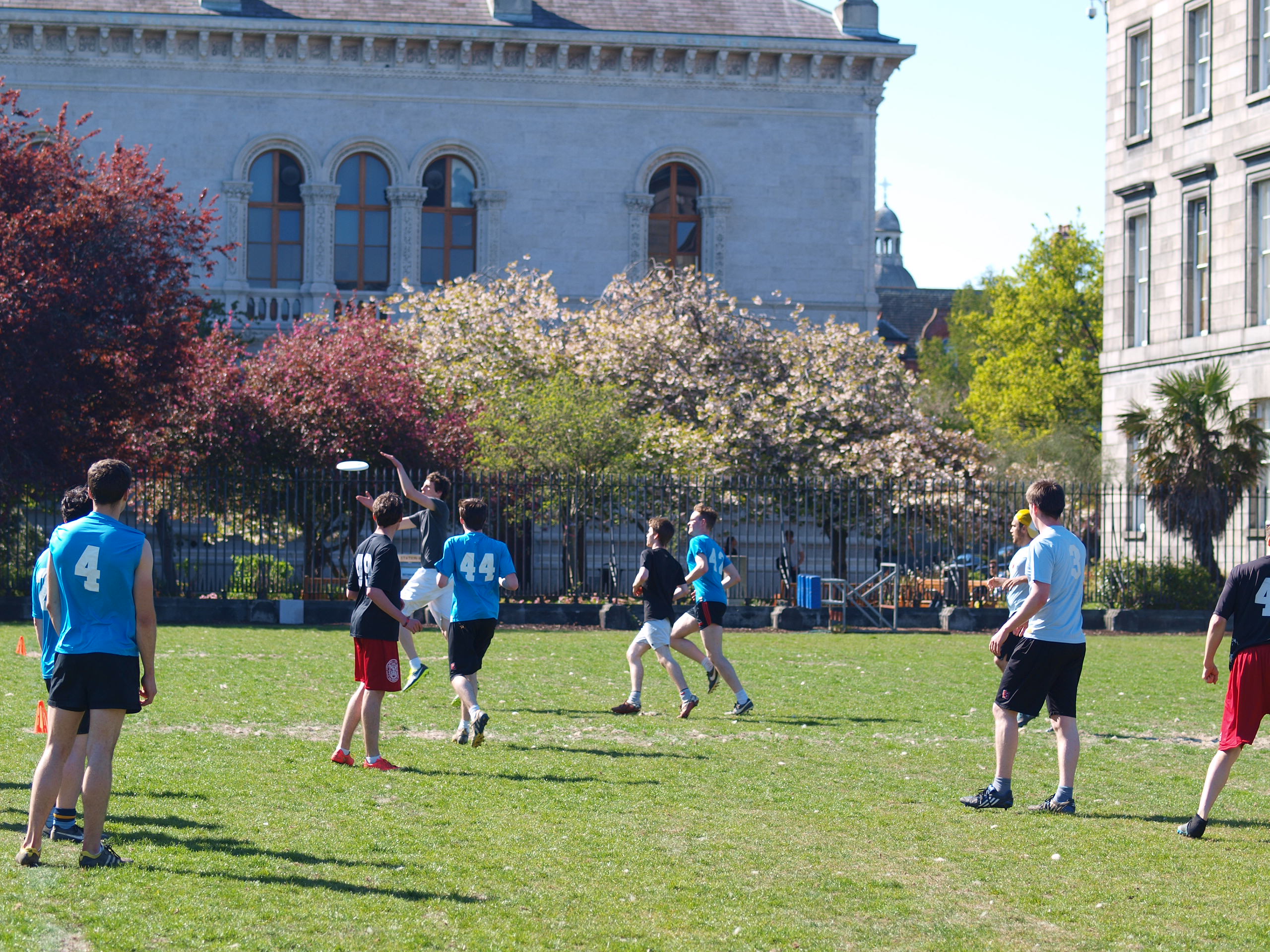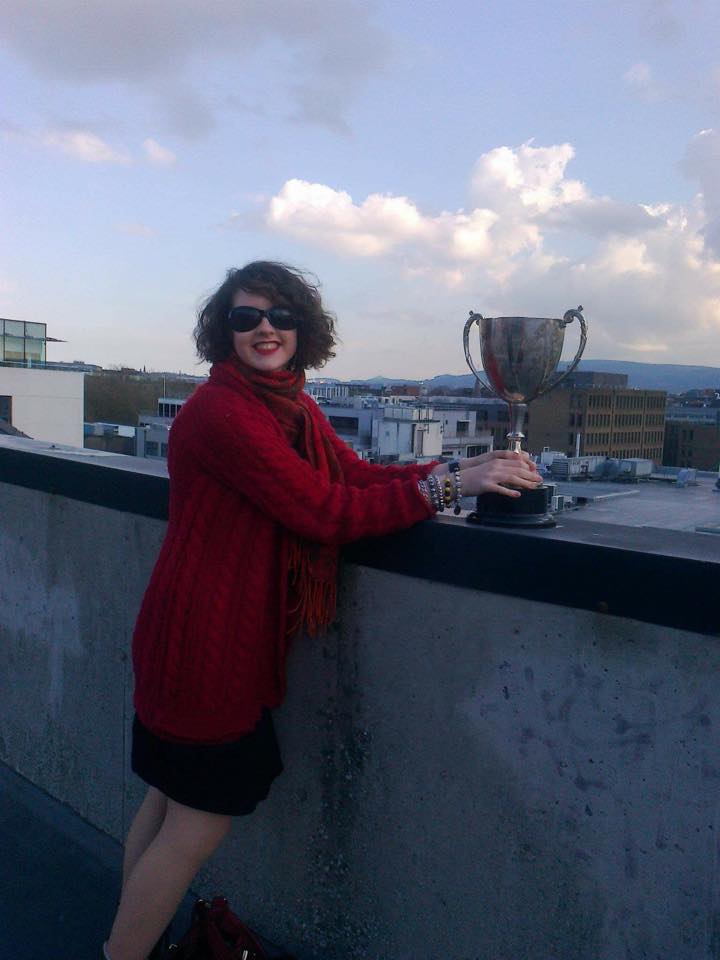
Sometimes having a tough rival on your doorstep is the best thing for growing ultimate.
Once upon a time, twenty summers ago, a random American (the first of many, it turned out) spent a semester in Dublin, Ireland. Having a disc but no one to play with, he turned to the locals. In 1995, Ireland was blessed with a summer that lasted more than one weekend—enough time for this Johnny Appleseed of ultimate to explain the basics of the game. He left a group of friends who were interested in starting a team when they began college the following fall.
Colleges grow the sport
This first nucleus of friends studied at Trinity College, right in the centre of Dublin. One of the ways to develop Ultimate in a new city (or a new country) is to target the colleges first, as this gives you access to a new ‘draft’ of freshmen every year. At Trinity College, it all began with the Freshers’ Fair.
The Freshers’ Fair is when all entrants to the college, whether they like it or not, have to walk through the front entrance to the college—and a wall of sound from 100 different societies and clubs competing for their attention. It’s noisiest near those grand wooden doors of the college, where the keenest and earliest to rise have the first chance to shout at the new students.
Beyond the melee, further down, quietly sitting, with a table, a chair, a pen, a piece of paper, and one dirty battered white disc, was the point where Irish Ultimate first took a foothold. It’s positively quaint to remember that most people at the time didn’t have an email address or cell phone number, and possibly not even access to a computer. Parents’ phone numbers, call boxes, or work numbers were often the only way to contact people.
Primitive as it was, this crude method of recruitment got barely enough for one D line. Fortunately one non-student also passed by the societies fair, curious to see if ultimate was played in Ireland. When the new college team found out he had played before, they promptly asked him to coach. From these inauspicious origins, the first Dublin and first Irish team was started.
One ultimate club is not enough
The trouble is, one team is never enough. The back-of-the-envelope plan was clear. Trinity needed someone to play against. As luck would have it, a similar group happened to be forming 20 miles away. In the beautiful but unlikely surroundings of Maynooth’s Priest College, another bunch of keen disc aficionados wanted to liven up their quiet weekends.
Despite the unusual location of this second team, contact was made between the two colleges and the inaugural Irish ultimate match was played soon after. Trinity, perhaps aided by their larger contingent of international players, won the first game of ultimate on Irish soil.
From here it would have been great if things had just rolled on smoothly. Maynooth, however, was a little too far away, and bolstered by too many visiting Americans. Once they completed their junior year abroad, they returned home—despite the best efforts of a few natives, the Maynooth team died out.

Always keep recruiting
Back at Trinity, within two years of that first recruitment drive, none of the original natives were still playing. This would have been the death of the club, but those two years bought enough time to find a collection of expats—English, American, Canadian, Italian, and even Australian. Most of these were tech workers who came during the so-called Celtic Tiger, Ireland’s IT economic boom. None of the players were actually students at Trinity, but the central location provided a strong lure to play. The pitch was situated in the idyllic green grass of the college cricket ground, a literal oasis of green in the busy heart of Dublin.
With a regular game right in the heart of Dublin, Trinity was able to lure in a second wave of Irish players. It was these students who would go on to represent and captain Ireland at numerous European and international events over the following two decades.
Real Madrid needs Barcelona
However, for Dublin and subsequently Irish ultimate to really evolve, Trinity still needed opposition. The Trinity players knew this, and promptly set about figuring out how to launch teams in other Dublin colleges. The natural choice was University College Dublin (UCD). UCD is Dublin’s largest college by enrollment, and also in terms of playing space. They’re also Trinity’s historic rival across sporting, religious, and even socio-economic fault lines.
UCD was the traditional auld enemy! Players knew that creating a team at UCD could have repercussions for Trinity’s preeminence. Even so, for the growth of the sport and to have more meaningful matches, this was the logical next step for them to take, even if they took it reluctantly.
Trinity students, allied with the handful of Dublin-based ultimate immigrants, met with the President of UCD’s sporting societies and targeted UCD’s next sporting club recruitment fairs. Similar to the experience at Trinity, it took two or three years of recruitment fairs before another nucleus of friends came along who wanted to play ultimate. Once this happened, liftoff occurred and UCD rose rapidly in numbers, prominence, and ability. The Trinity / UCD monopoly of college ultimate then also became the motivation and inspiration for University College Cork (UCC) to rise up, and UCC set new standards by winning four college national titles in a row.

Latching on to existing sporting traditions
Trinity and UCD now have an annual Ultimate ‘Colours’ match. The name originates from the colleges’ annual rugby team match, held since 1952. To help legitimise ultimate among the wider college community and Dublin society at large, it made sense to follow the precedent set by rugby. For several years, while there were only two Irish college teams, the Colours match was the highlight of the season—an opportunity for each team to benchmark themselves against their local opposition. After Trinity’s initial success, the greater numbers and resources at UCD took precedence. For several years Trinity struggled to even field enough players for the game.
Brian McDevitt, an early Trinity captain, and subsequently a successful captain of the Irish open team, expressed relief that the game even had enough players to go ahead. Cian O’Morain, another Trinity captain, experienced a long period of UCD dominance, but used that to redouble his own team’s efforts. This ultimately resulted in victory and also historic success in leading the Trinity mixed team to win the UK Student Nationals, the first ever UK title for an Irish team.

Colleges and youth programs drive growth
The Trinity-UCD rivalry also helped to drive the growth of the sport into other colleges, initially in the Dublin area and then further afield. Dublin City University (DCU) was started with the help of players from the first two colleges, and the team at Dublin Institute of Technology (DIT) had similar roots. While it seems logical to try and get ultimate into colleges, many European countries have strong club ultimate with little to no college engagement. Ultimate often has a high turnover of players. While annual college freshers’ fairs offer an ideal opportunity to keep replenishing your player base, colleges also regularly lose players to graduation. Trinity itself once paid the price for this when the team failed to retain any freshers and their performance suffered that following year.
Ultimate is now played in Ireland from school level up to Open (no masters yet). Ireland’s first women’s match was also at Colours, another stepping stone on the path towards the growth of Irish ultimate. It is quite likely that this would not have been the case without the initial local rivalry created from the annual TCD / UCD showdown.
Twenty years later Irish Ultimate has reached the relative position of strength it now finds itself in, with healthy competitive competitions at Open, Mixed, College, and Schools level. Much like the first inaugural Johnny Appleseeds from Columbia High in ‘69, spreading Ultimate from just one car parking lot across the colleges of the US. So too those early players in front of the Trinity Pavillion cricket club from 1995-99 helped set the stage for the growth of Ultimate across the whole of Ireland.







Comments Policy: At Skyd, we value all legitimate contributions to the discussion of ultimate. However, please ensure your input is respectful. Hateful, slanderous, or disrespectful comments will be deleted. For grammatical, factual, and typographic errors, instead of leaving a comment, please e-mail our editors directly at editors [at] skydmagazine.com.